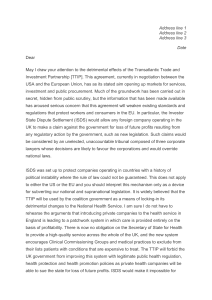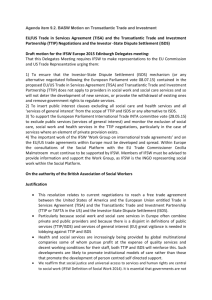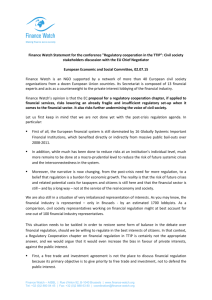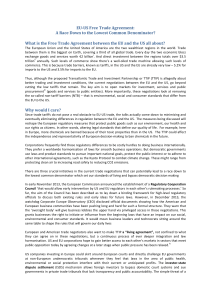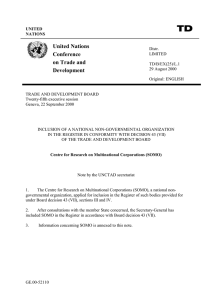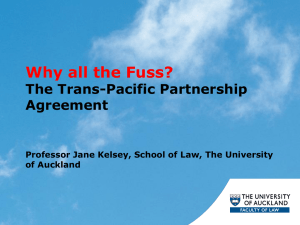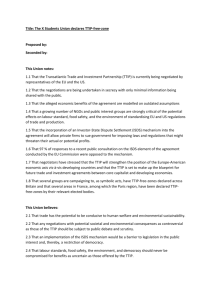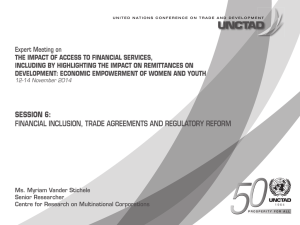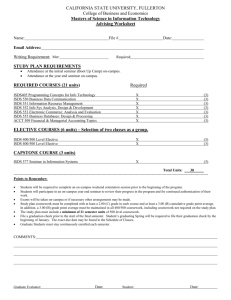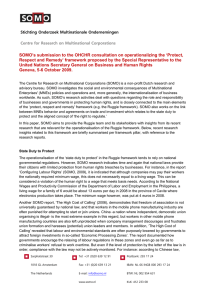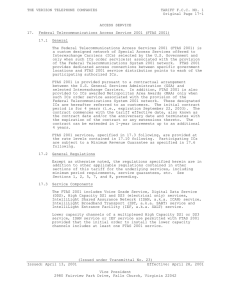Ms. Myriam Vander Stichele Senior Researcher SOMO Netherlands
advertisement
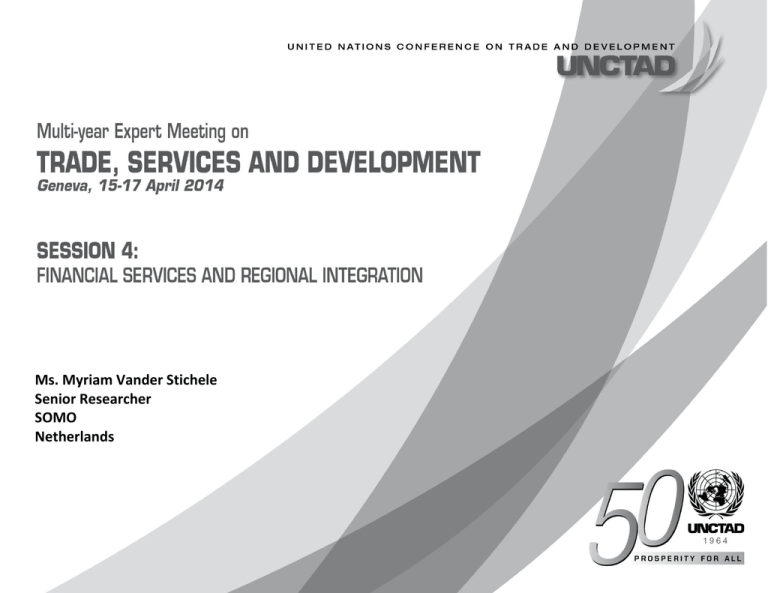
Ms. Myriam Vander Stichele Senior Researcher SOMO Netherlands New trends in financial services negotiations in EU FTAs Myriam Vander Stichele Senior Researcher SOMO UNCTAD – 16 April 2013 Focus of this contribution financial services in FTAs and financial stability: ■ Issues to discuss ■ Difficulties of third country supervision and cooperation News trends in EU FTAs: ISDS: adaptations Regulatory cooperation Issues to discuss: financial services liberalisation vs financial stability Increasing interconnectedness, including through restrictions on capital flows in FTAs Increased competition leads to : ■ more risk taking ■ less diversity in financial services ■ larger financial service providers some of which become too big to fail and too big to be useful for the economy (while FTA/GATS prohibit restrictions on value of transactions and imposing legal forms e.g. to split /separate banks) Financial services in FTAs vs public interest ‘Protecting financial stability’ (prudential carve out in FTAs: ‘not more burdensome than necessary’), not integration the public interest and consumers’ interests = flexibility for regulating for non-financial (i.e. not ‘prudential’) policy objectives e.g. universal access to finance, cheap finance for housing Undermining regulatory flexibility that is based on regional needs and diversity No integration of how the financial sector should contribute to sustainability The aftermath: problems of the supervision of third country financial services Third country financial service providers, operators (e.g. exchanges, trade repositories) and trading entities (e.g. hedge fund managers) : ■ Authorisation: at national or EU level : complex web ■ Supervision: equivalence acts, agreements for information exchange and cooperation in supervision (e.g. for agricultural commodity derivatives markets: national and EU financial and agricultural authorities cooperation) ■ Regulatory differences: pressure from financial industry for temporary relief vs. reform progress respect for rules agreed by parliaments New trends in EU FTAs & financial services: ISDS EU-Canada FTA: adaptions for financial services? TTIP: investor to state dispute settlement system among developed countries ■ Proposal: support by business and protests by citizens ■ Consultation by EC : http://trade.ec.europa.eu/doclib/press/index.cfm?id=1052 ■ What adaptations? Protect right to regulate preventing the risk of abuse of the system (e.g. frivolous cases and attacks on legitimate regulations’) Making the arbitration system more transparent Preventing conflicts of interest or bias in arbitrators Ensuring better consistency and control ISDS will only apply to breaches of investment protection provisions and to not other parts of TTIP NB: US financial sector sued US financial regulatory authorities before courts to oppose new regulations (position limits) EU proposals for changes in ISDS Has a clear definition of 'Fair and Equitable Treatment' based on a closed list of elements; Includes a clarification that 'Fair and Equitable Treatment' does not imply that the Parties would not be able to modify or introduce new legislation; Clarifies that measures taken for public welfare objectives such as health, consumer protection or the protection of environment cannot be considered equivalent to indirect expropriation; Envisages an Appellate Mechanism for investor-to-state dispute settlement; Includes the principle of 'costs follow the law', whereby the losing party pays all costs relating to the dispute, as a disincentive against frivolous or tactical claims; Includes provisions against treaty-shopping, by clarifying that investors who tactically restructure their investments to be able to bring themselves within the scope of the TTIP (for example, by setting up a shell company in the US) will not be able to bring an ISDS claim; Includes a binding code of conduct for arbitrators setting out in detail the level of independence expected of them. The aim is to avoid as far as possible conflicts of interest. Newest trend: Regulatory cooperation TTIP: most benefits will from ‘disciplines’ on regulation/NTBs (vs. disciplining the financial sector?) EU proposal in TTIP vs US: ■ include financial services in regulatory cooperation framework (cf. Canada, TISA, …) ■ US refuses financial regulatory cooperation in trade agreement, favours multilateral fora, more go-it-alone regulation if others are weak, limiting interconnectedness (‘balkanisation’of financial sector) ■ More far-reaching than in currently seem to be included in EU-Canada RTA ■ Pushed by financial sector Important elements of regulatory cooperation as proposed be EC: ■ cooperate to make joint proposals in, and dominate, international standard setting bodies, and apply international standards ■ Strive towards equivalence /substituted compliance / mutual reliance / regulatory consistency : rely on each others rules vs. all under domestic supervision ■ Consult before (parliamentary) decisions on new regulations or measures (that seriously affect the other party) ■ Cooperate to remove barriers to trade in financial services Regulatory cooperation: critical points Priority to supervisory cooperation overlooked Objective is only financial stability: overlooking overall economic and public interest of financial services Basically deciding how to regulate and legislate : without involvement of the regulators, parliamentarians, citizens (including at international standards setting bodies) Institutionalising input of financial lobby in early stages Reliance on each other rules and supervision: how effective and democratic? What access to remedies for consumers in case of problems? Cooperation would be legally binding among states potential for regulatory chill, race to the bottom Literature & websites M. Vander Stichele, R. van Os, Business as Usual - How Free Trade Agreements Jeopardise Financial Sector Reform, December 2010, http://somo.nl/publicationsen/Publication_3611 M. Vander Stichele, The Missing Dimension, November 2011, http://somo.nl/publications-en/Publication_3712 THANK YOU ! SORRY TO LEAVE EARLY BUT CONTACT ME AT: myriam@somo.nl http://somo.nl/themes-en/trade-investment
